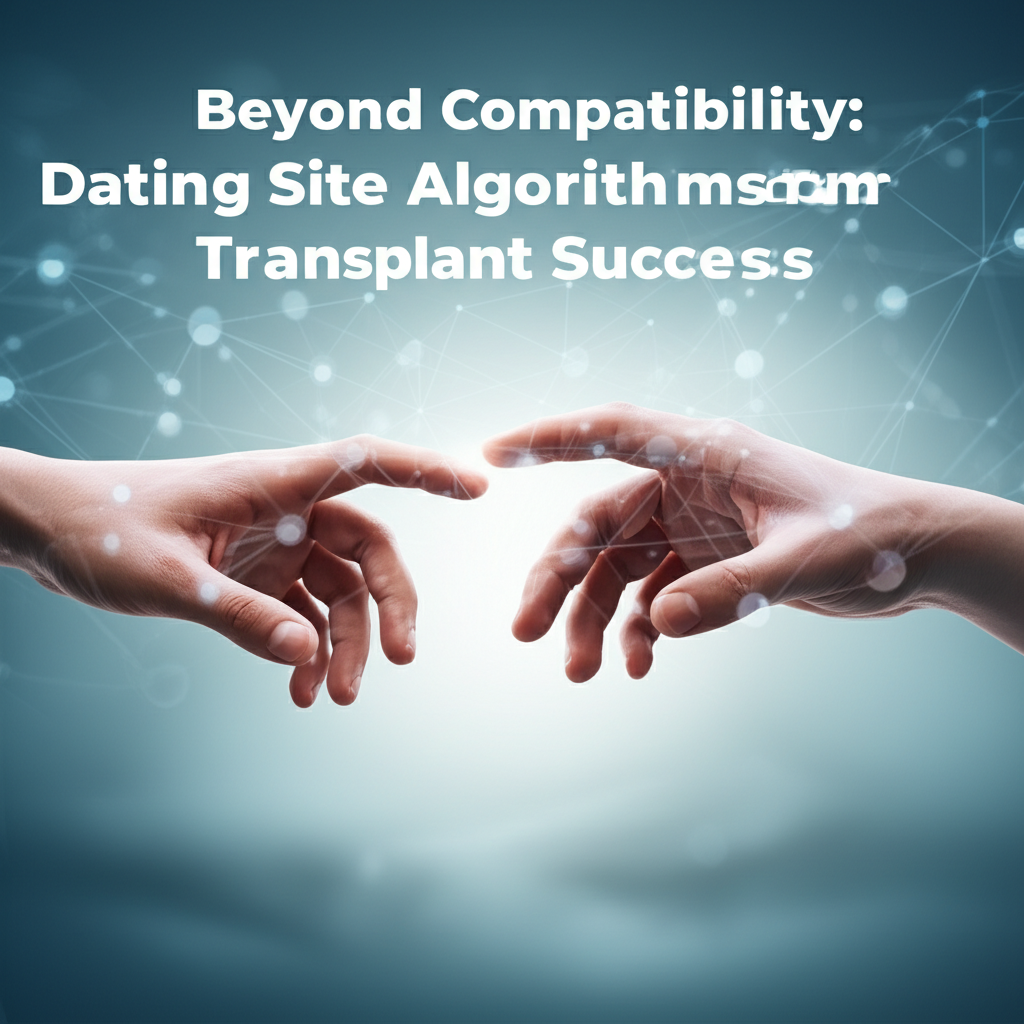Beyond Compatibility: Dating Site Algorithms for Transplant Success
Exploring the innovative application of matching technology in improving liver transplant patient outcomes.
The quest for successful organ transplantation is a complex one, involving not only medical expertise but also careful patient selection and post-operative care. While advancements in surgical techniques and immunosuppressive drugs have significantly improved survival rates, researchers are now looking to unconventional sources for insights that could further enhance these outcomes. One such area is the sophisticated matching algorithms employed by online dating platforms, specifically eHarmony, which are being investigated for their potential to predict and improve the success of liver transplants.
The Science of Connection: From Romance to Recovery
At its core, successful organ transplantation hinges on a crucial element: compatibility. Just as a dating site aims to pair individuals with complementary personalities and life goals, the medical field strives to match donor organs with recipients to minimize rejection and promote long-term health. The underlying principle involves assessing a multitude of factors to predict a successful union. For liver transplants, these factors range from blood type and tissue compatibility to the recipient’s overall health, lifestyle, and even their psychosocial support system.
The hypothesis being explored is that the detailed profiling and algorithmic matching employed by platforms like eHarmony, designed to predict long-term relationship success, could be adapted to assess the likelihood of a successful liver transplant. This approach moves beyond purely biological markers to consider a broader spectrum of patient characteristics that might influence recovery and adherence to treatment, critical elements in transplant success.
Beyond Biological Matches: A Holistic Approach to Transplant Viability
Traditional transplant matching primarily focuses on immunological factors to prevent the recipient’s body from rejecting the new organ. However, medical professionals recognize that a patient’s ability to manage a lifelong regimen of medication, adhere to dietary restrictions, and navigate the emotional and lifestyle changes post-transplant also plays a significant role. This is where the insights from relationship-matching technology become relevant.
“The same process used by an international matchmaking site to pair lonely hearts may hold the key to improving the outcomes of liver transplants,” according to a report from The Herald Sun. While the source is a news article and not a primary scientific publication, it points to research that considers a more comprehensive view of patient suitability. The idea is that by analyzing a wide array of data points – potentially including psychological profiles, social support networks, and lifestyle habits – a more accurate prediction of post-transplant success could be achieved.
Potential Benefits and Challenges of Algorithmic Matching in Healthcare
The potential advantages of this approach are significant. If sophisticated algorithms can better identify patients who are more likely to thrive after a transplant, it could lead to more efficient allocation of scarce donor organs. This could translate into improved survival rates, reduced rates of organ rejection due to non-adherence, and ultimately, a better quality of life for transplant recipients.
However, the application of such technology in a medical context presents considerable ethical and practical challenges. The data used in dating sites is typically self-reported and anonymized, whereas medical data is highly sensitive and subject to strict privacy regulations. Furthermore, the criteria for a successful romantic relationship are subjective and differ vastly from the objective medical outcomes required for transplant success. Ensuring patient privacy, data security, and the ethical use of personal information are paramount concerns that would need to be rigorously addressed.
Moreover, it is crucial to distinguish between correlation and causation. While a dating site’s algorithm might be effective at predicting relationship compatibility, its success in predicting transplant outcomes would require robust, peer-reviewed scientific validation. The medical community would need to be convinced that the factors identified by the algorithm are indeed strong predictors of transplant success and that they do not inadvertently introduce bias against certain patient demographics.
Navigating the Future of Transplant Selection
The exploration of unconventional technologies to enhance medical outcomes is a testament to the continuous innovation in healthcare. While the direct application of dating site algorithms to liver transplant selection remains an area of research, the underlying principle of using comprehensive data to predict success is a promising avenue. Future research may focus on developing bespoke algorithms that incorporate both biological and psychosocial factors, drawing inspiration from the data-driven approaches of successful technology platforms.
As the field progresses, it will be vital to maintain transparency and ethical standards, ensuring that any new selection criteria are validated through rigorous scientific study and implemented with the well-being of patients as the utmost priority. The goal is to leverage technology to save more lives and improve the long-term health of those who receive the gift of a transplant.
Key Takeaways:
- Researchers are investigating the use of matching algorithms, similar to those used by dating sites, to improve liver transplant success rates.
- The concept moves beyond purely biological compatibility to consider a broader range of patient factors, including psychosocial support and lifestyle, which influence post-transplant recovery.
- Potential benefits include more efficient organ allocation and improved patient outcomes.
- Significant ethical and practical challenges exist, including data privacy, security, and the need for rigorous scientific validation.
- The medical community requires strong evidence to support the use of such novel approaches in patient selection.
Moving Forward:
Readers interested in the scientific advancements in organ transplantation can follow the work of leading transplant centers and research institutions. Staying informed about new studies and ethical discussions surrounding patient selection criteria is encouraged.


























